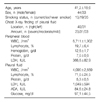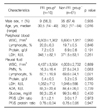Abstract
Background
A paradoxical response is defined as the radiological and clinical worsening of a previous lesion or the development of new lesion after initial improvement during theprocess of antituberculous treatment. The related factors for the development of a paradoxical response in patients with tuberculous pleurisy are not certain.
Methods
We selected patients with tuberculous pleurisy who had been treated for more than 4 months. The changes onthe serial chest X-ray findings before and after treatment were reviewed. Paradoxical responses were regarded as any worsening or development of new lesion at least 2 weeks after the initiation of treatment. The baseline clinical characteristics and laboratory findings of the peripheral blood and pleural fluid were compared between the patients with a paradoxical response and the patients without a paradoxical response.
Results
Paradoxical responses appeared in sixteen patients (21%) among the 77 patients.It took a mean of 38.6 days after the treatment and the time to resolve the paradoxical response was a mean of 32.1 days. For the patients with a paradoxical response, the median age was younger (30.5 years vs 39.0 years, respectively) and the lymphocytic percentage of white blood cells in the pleural fluid was higher (82.1% vs 69.6%, respectively) than for the patients without a paradoxical response.
Figures and Tables
 | Figure 1Comparison of age (A) and lymphocytic percentage in pleural fluid (B) between patients with paradoxical response and without paradoxical response. Both comparisons showed significant difference (p<0.05). Horizontal bars mean median value (A) and mean value (B). PR: paradoxical response. |
References
1. Hung SC, Chang SC. New pulmonary lesions during therapy for extrapulmonary tuberculosis. Chest. 1999. 116:1794–1797.
2. Onal IK, Bayraktar Y, Unal S. Paradoxical deterioration during the course of antituberculous treatment. J Natl Med Assoc. 2006. 98:954–955.
3. Al-Majed SA. Study of paradoxical response to chemotherapy in tuberculous pleural effusion. Respir Med. 1996. 90:211–214.
4. Marshall BG, Chambers MA. Central nervous system tuberculosis: the paradox of the host immune response. J Infect. 1998. 36:3–4.
5. DeSimone JA, Pomerantz RJ, Babinchak TJ. Inflammatory reactions in HIV-1-infected persons after initiation of highly active antiretroviral therapy. Ann Intern Med. 2000. 133:447–454.
6. Campbell IA, Dyson AJ. Lymph node tuberculosis: a comparison of various methods of treatment. Tubercle. 1977. 58:171–179.
7. Kim SH, Chung HY, Lee GD, Shin MG, Jung TS, Jin BC, et al. Clinical characteristics of paradoxical response to chemotherapy in pulmonary tuberculosis. Tuberc Respir Dis. 2002. 53:27–35.
8. Cheng VC, Ho PL, Lee RA, Chan KS, Chan KK, Woo PC, et al. Clinical spectrum of paradoxical deterioration during antituberculosis therapy in non-HIV-infected patients. Eur J Clin Microbiol Infect Dis. 2002. 21:803–809.
9. Narita M, Ashkin D, Hollender ES, Pitchenik AE. Paradoxical worsening of tuberculosis following antiretroviral therapy in patients with AIDS. Am J Respir Crit Care Med. 1998. 158:157–161.
10. Navas E, Martin-Davila P, Moreno L, Pintado V, Casado JL, Fortun J, et al. Paradoxical reactions of tuberculosis in patients with the acquired immunodeficiency syndrome who are treated with highly active antiretroviral therapy. Arch Intern Med. 2002. 162:97–99.
11. Wendel KA, Alwood KS, Gachuhi R, Chaisson RE, Bishai WR, Sterling TR. Paradoxical worsening of tuberculosis in HIV-infected persons. Chest. 2001. 120:193–197.
12. Valdes L, San Jose E, Alvarez D, Valle JM. Adenosine deaminase (ADA) isoenzyme analysis in pleural effusions: diagnostic role, and relevance to the origin of increased ADA in tuberculous pleurisy. Eur Respir J. 1996. 9:747–751.
13. Cheng VC, Yam WC, Woo PC, Lau SK, Hung IF, Wong SP, et al. Risk factors for development of paradoxical response during antituberculosis therapy in HIV-negative patients. Eur J Clin Microbiol Infect Dis. 2003. 22:597–602.
14. Jafari C, Ernst M, Strassburg A, Greinert U, Kalsdorf B, Kirsten D, et al. Local immunodiagnosis of pulmonary tuberculosis by enzyme-linked immunospot. Eur Respir J. 2008. 31:261–265.
15. Viard JP, Mocroft A, Chiesi A, Kirk O, Røge B, Panos G, et al. Influence of age on CD4 cell recovery in human immunodeficiency virus-infected patients receiving highly active antiretroviral therapy: evidence from the EuroSIDA study. J Infect Dis. 2001. 183:1290–1294.
16. Toossi Z, Young TG, Averill LE, Hamilton BD, Shiratsuchi H, Ellner JJ. Induction of transforming growth factor beta 1 by purified protein derivative of Mycobacterium tuberculosis. Infect Immun. 1995. 63:224–228.
17. Hiraoka K, Nagata N, Kawajiri T, Suzuki K, Kurokawa S, Kido M, et al. Paradoxical pleural response to antituberculous chemotherapy and isoniazid-induced lupus: review and report of two cases. Respiration. 1998. 65:152–155.
18. Reiser M, Fatkenheuer G, Diehl V. Paradoxical expansion of intracranial tuberculomas during chemotherapy. J Infect. 1997. 35:88–90.
19. Kim JY, Kwon JH, Kim MJ, Chang HW, Hwang JS, Cho KB, et al. Paradoxical response during antituberculous treatment for abdominal tuberculosis. J Korean Radiol Soc. 2006. 55:599–605.
20. Yano S, Kobayashi K, Kato K, Tokuda Y, Ikeda T, Takeyama H. Paradoxical worsening of pulmonary Mycobacterium abscessus. Respir Med. 2007. 101:868–870.
21. Jang KJ, Jwa CS, Kim KH, Kang JK. Paradoxical deterioration of intramedullary spinal tuberculomas during antituberculous therapy. J Korean Neurosurg Soc. 2007. 41:408–410.
22. Subhash HS, Supriya S, Prakash B, Thomas K. Acute respiratory distress syndrome as a paradoxical response to anti-tuberculous and anti-retroviral therapy. Indian J Tuberc. 2006. 53:157–160.




 PDF
PDF ePub
ePub Citation
Citation Print
Print




 XML Download
XML Download